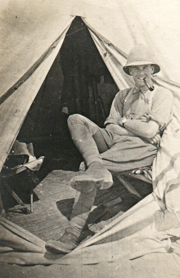We were to be up early, attack or no attack, to build some sort of cover or dug-out for the men in case of bombardment. I was woken up at 5 (not very early) by sounds of shelling and rifle-fire. But it was not very close, and I rushed down from my tent (we had slept in our clothes) and got the men on to digging their places. We had hardly got our shovels out and got started when 3 or 4 German aeroplanes came over and hovered round us. We lay down on our stomachs, according to the brigade order, and watched them dropping bombs round us, but concentrating mostly on railhead, where all our stores, munitions, etc were stationed. About 20 or 30 bombs were dropped, and we got up, and the shelling got louder and nearer, and the hum and buzz of movement of troops etc became more emphatic. It was not long before we ourselves got it.
We were just in the middle of our breakfast (I had just had a cup of tea), when, with a whiz and a crash, a great shell pitched in the camel lines, just the other side of the narrow marsh over which our camp was situated, on a 40 foot sand-hill. I rushed out of the hut, and the camp was cleared in very shortest possible time - in fact, just in time - and we all rushed to the bottom of the hill, near our guns; but we had no dug-outs, and could only lie flat on our stomachs. I looked through my glasses to see what damage the first shell (6" - 8") had made. I saw 3 or 4 dead camels, and a dead dago, but by the look of the thing you would think there wasn't a camel or dago alive. Thick black smoke enveloped the place, and out of the smoke you could see the dagos running for their lives (they had cleared out all the natives except camel-drivers from the camp ages ago).
After a good many shells had pitched on the various hills (in search no doubt of observing stations) I think they may have caught the flash of a helio set up just in front of our camp by our garrison gunners; as the nearer they came, the lower went our heads in the sand, like the famous ostrich. Nearer and nearer they came. Whiz, Bang. Crash!! Just on top of us, right in our cook-house, and bits flying all round us - one went between Dick Fleming's and my head!!! It was only about 50 yards away from us, and they only had to add another 25' and put on 5 degrees more right, and that would have been into the lot of us. By the smoke we thought the whole camp was on fire. You could get up and look in between the rounds, as you could distinctly hear the gun fire and the shells coming, and after a time, you could tell whether they were coming your way or not. The shells took about 15 seconds to get there, so you had time to lie down, and hope you would not be the unlucky ones.
Well the next one went just next to the cook-house, and again the whole camp seemed on fire, and the bang was something terrific. One of our men described it very well, as being "like a ton of coals falling through a glass house on to a concrete floor". It was certainly nerve-racking. Well the next shot was 25 yards further on, just above us, but luckily he did not switch the 6'; it crashed straight into our tents where the telephone men, etc sleep. There were 3 of them in the tent ten yards away sticking to their job at the telephone, and not one of them was hurt!!! though the line was broken to atoms and had to be repaired at once.
At this time, shrapnel and high explosive, big and small shells were pouring in from the Turks as fast as they could fire their many guns, but our actual camp got very little except a few strong shrapnel shells which aren't very frightening, as the Turks don't know how to burst them low. Railhead suffered very badly, shells were pouring into it so fast we thought all our supplies must have been blown up.
After this there was a lull for about 5 minutes, and this gave you the opportunity of hearing the rifle fire, the sound of which coming in such regular intervals has quite a fascination at a distance. As soon as this momentary lull was over, the storm of shell fire broke out with such an intensity that you can hardly conceive on our forts, one of which had foolishly been constructed round the position on the top of a sand hill visible from Katia. This fort got about 500 eight inch shells in or round it, and the first shot blew up a very great friend of mine in the West Riding battery of our brigade, called Hawkins, who came over in the boat with us, and we were always together ever since, and he used to come and swim with us always at Kantara, about 6 ft 4 and good-looking and very bright. Poor fellow but he knew little of it. They say that the shell must have struck him full on; there was little left of him. He was observing from that fort. Badcock was at that time in our F.O.P. which was fortunately not observed by the enemy, and got no shelling. At 9 our batteries opened fire on the enemy at targets observed by the F.O.O.s. By Jove! we gave it to them hot. We had our monitor firing 10" shells at them besides our other guns.
The enemy's attack at this time began to develop, as our Colonel (who had been acting Brigadier), and had had the placing of the batteries as his job, had anticipated. It developed first in the Southerly direction, the enemy's object being to work his way round us first, and cut our railway communication and then attack us in front. The Anzacs and some infantry held the south and the latter were getting it rather hot on a certain ridge called "Wellington Ridge", and the Colonel of the infantry in that part asked to see an officer of our brigade to arrange for us to assist him, as he was being pressed.
I was sent out and had great difficulty in finding my way, as our Colonel didn't know where to find him, and no-one I asked seemed to know, and all the time I was coming under shrapnel fire, and the further I went from the camp, the nearer I came to the rifle-range; till I got to a part of the position where I not only heard the bullets whizzing by, but actually saw them land in the sand with a little splash, nearer than was to my liking. Still I knew I couldn't return without delivering the message. I found the Colonel (Walsh) at last, and gave him the message. When I came back, our battery and all the other batteries were still firing, and except for the pounding away at Fort 6 where every shell seemed to blow the fort to bits, the enemy's fire began slightly to slacken. (And this continued very gradually till the evening.)
After lunch, which I was now able to have in our mess tent (as the firing was chiefly around the forts out South), we fired intermittently, as did the enemy, at any target that sprang up.
At 5, Dick Fleming was sent to get fresh ammunition at the Dump at Railhead. I saw him just before he went. I then went down to the guns to relieve Elliot, and I hadn't been there half an hour, when a message came to me that Fleming was slightly wounded in the head. Elliot came down later and told me I should never see him again. I nearly broke down - hardly believing it. Elliot then told me he had received a piece of bomb right through his head, that he was unconscious all the time, and his death was expected any minute.
From that moment my life seemed to change, and these shells and bombs which had seemed to do such little damage to our battery had now a very different aspect. The very thought that one so young, good and happy had been the only one to be taken from us, made me lose a bit of that confidence in myself that hitherto had kept me from fear. I only wish you had known Dick Fleming as I knew him. I was completely in his confidence, and a more delightful, gentlemanly, brave, keen, manly, cheerful and clean-minded boy has ever to my small experience - or anyone else's who knew him - existed.
I don't think that for a long period of time just before he died (he passed away at 9.30) I could think of a single fault, either that he could or couldn't help. He had everything! Even brains. He had read more than anyone I know for his age, and he read quickly, as his brain worked quickly and he could take things in quicker than most people. You should have seen the letter the Colonel wrote about him. These are extracts:-
"I used to try and talk to him as much as I could, not to teach his his work - he knew that - but to learn something of manners and courtesy, which he possessed in a degree higher than in anyone I have met."
"I have met one or two boys in my experience of his nature who have reached such a height of perfection possible in this world, that they have nothing else to learn, and in every case that I can remember, they have had an early death."
An English Gentleman is what I would call him, though not a typical one, as that wouldn't be a very praiseworthy attribute. An Ideal English Gentleman - an ideal man - is a perfect description of him.
How I shall miss him after the war! "After the war", that was always his expression. He was full of adventure. He was going to Cyprus on his way home, or through Palestine, and one day he was going to take a trip to Newfoundland; he loved all sport, and there you could get any amount of fishing and shooting. His was not only talk, as in most people, he intended to do it. He had already proved his bravery in his mountain-climbing in Switzerland. Our trip to Cairo together I shall never forget all my life.
Our Major has written to his people. I should like to, but don't want to burden them with letters that only add to their sorrow. What a fine fellow the British Empire has lost! A photograph of his grave in the heart of the desert I shall get if I can. On the day of the fight he was as cheerful as ever, and his heart was in it, and any of us would have died to let him see the end of the battle.
You should see the letters the men are writing home about him! One man wrote a long poem of Dick, but I am afraid it bordered on the comic, though every word of it was meant, and some quite pathetic.
He died on the day after his 20th birthday.


